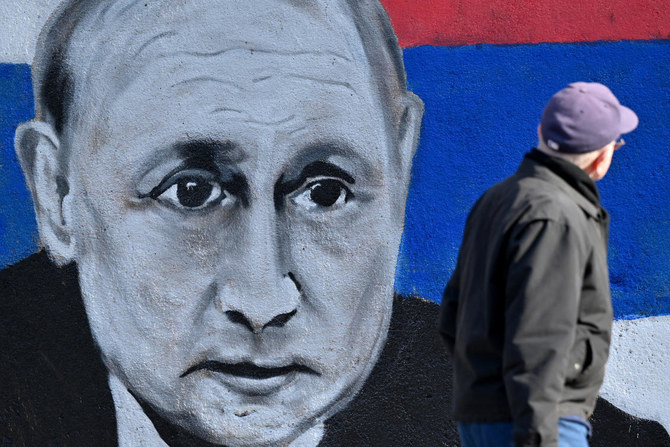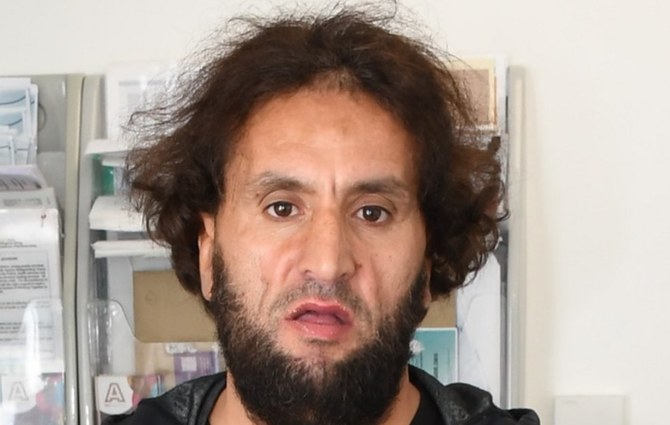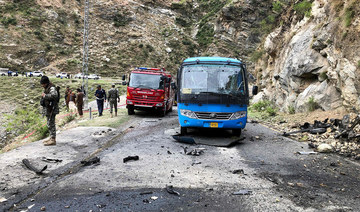BELGRADE: As free speech was curtailed, her friends imprisoned and the Russian economy tanked in the days after Vladimir Putin ordered the invasion of Ukraine, Marina packed her bags and fled Moscow.
But more than a thousand miles away in her new home in Serbia, the 41-year-old former travel agent has found herself unable to escape the long arm of Russian propaganda in Belgrade where the Kremlin’s war enjoys broad support.
“Some locals tell me they support Russia when they learn I am from Russia. They say it to express their support, but it turns out this support extends to supporting Putin and his actions and the war,” Marina told AFP, who asked to withhold her surname.
In the weeks following the invasion, Serbia has become a haven for many Russians hoping to escape abroad, with the country providing one of the few regular flight routes into Europe following mass bans across the continent.
For centuries, Serbia and Russia have been united by deep fraternal links thanks to their Slavic and Orthodox heritage. And while Serbians have welcomed Russians with open arms, it is not without contradictions.
The Russians by and large resettling in Serbia have sought to flee from the catastrophic fallout at home sparked by Putin’s invasion of Ukraine.
Serbia, however, has remained an outlier in Europe where large swaths of its population continue to back Putin’s self-described war against the West in Ukraine.
Much of the support for Putin is rooted in the collective hatred of NATO, with memories of the alliance’s bombing of the country in the 1990s still fresh in the minds of many in Serbia.
In Belgrade, hundreds of demonstrators hailing Putin and condemning NATO have taken to the streets, as the government has wafted between condemning the war at the United Nations while refusing to sanction Moscow at home.
The catch-22 has led to occasional confrontation, according to Marina, who said conversations with Serbia supporters of Putin oftens sparks feelings ranging from rage, despair, and shame.
“It turns out that this person is bombarded with Russian propaganda and actually believes that pictures of destroyed cities and dead people in Ukraine are fakes,” says Marina.
“And this mindset is so strong I don’t believe I can do something so I give up and quit the conversation.”
There is no official tally of the number of Russians who have decamped to Serbia — they can stay visa free for 30 days — but a Telegram group for new arrivals already numbers in the hundreds.
Among the conversation topics on the group includes advice on how to handle the unwanted affection from Serbians backing Putin.
IT specialist Iakov Borevich said he chose Belgrade due to the “closeness of culture” with Russia and the “mentality” but has grappled with some of the pro-Kremlin sentiments on the street, including a mural of Putin near his new apartment that says “Brother” in Cyrillic.
But Borevich said he also remains somewhat sympathetic to the outpouring of emotion in Serbia that has also entangled many of his fellow Russians who often conflate patriotism with supporting Putin.
“Perhaps, for the population of the country, for Serbia, the face of the country is the leader, and this manifests as positive feelings toward Russia,” says Borevich.
For many, leaving Russia was a difficult decision — one that was made in a matter of hours while packing a few belongings and leaving behind friends and loved ones.
“My dad told me I was not a patriot anymore... and that I have to stay and contribute to the economy,” says Kirill, a 31-year-old civil engineer, who recently relocated to Belgrade.
“But I completely understood that if I stayed, all the taxes I’d pay would be a straight contribution to the war.”
Even still, he remains unsure if he will stay in Serbia or return home to St. Petersburg.
Others fear they will never go back amid Putin’s ongoing crackdown on dissent as a new iron curtain closes off Russia from much of the world.
“As soon as I came here, I felt a great weight lifted off my shoulders,” said Marina.
“Now I am horrified to see what is happening in Russia.”
Fleeing Putin, Russians resettle in pro-Kremlin Serbia
https://arab.news/bfja4
Fleeing Putin, Russians resettle in pro-Kremlin Serbia

- There is no official tally of the number of Russians who have decamped to Serbia
Elon Musk confirms Twitter has become X.com

- Billionaire head of Tesla bought Twitter for $44 billion in late 2022 and announced rebrand to X last July
- Although the logo and branding were changed to “X,” the domain name remained Twitter.com until Friday
PARIS: The social network formerly known as Twitter has fully migrated over to X.com, owner Elon Musk said on Friday.
The billionaire head of Tesla, SpaceX and other companies bought Twitter for $44 billion in late 2022 and announced the rebrand to X last July.
Although the logo and branding were changed to “X,” the domain name remained Twitter.com until Friday.
“All core systems are now on X.com,” Musk wrote on X, posting an image of a logo of a white X on a blue circle.
Queries to Twitter.com redirected users to X.com on Friday morning, though the original domain name still appeared on some browsers.
Musk has repeatedly used the letter X in the branding of his companies, starting in 1999 with his attempt to set up an online financial superstore called X.com.
When he bought Twitter, he set up a company called X Corp. to close the deal.
Musk has said he wants “X” to become a super-app along the lines of China’s WeChat.
The Chinese app is much bigger than X and weaves together messaging, voice and video calling, social media, mobile payment, games, news, online booking and other services.
He has also bolted onto X an AI chatbot called “Grok,” which was launched in Europe this week.
Musk’s leadership of X has proved controversial.
He has fired thousands of staff, overseen major technical problems and reinstated accounts of right-wing conspiracy theorists, as well as former US president Donald Trump.
European regulators have also begun probes into X and other social media platforms over fears of misinformation.
The EU demanded earlier this month that X explain its decision to cut content moderation staff, giving the firm a deadline of Friday.
AFP has contacted X for their response.
Taliban supreme leader makes rare visit to Afghan capital

- Hibatullah Akhundzada gave a speech in front of the 34 provincial governors
- The appointment of officials on the basis of “favoritism or personal relationships” was also to be avoided
KABUL: The shadowy supreme leader of the Taliban authorities made a rare visit to Afghanistan’s capital, a government website said Friday, leaving his reclusive compound in Kandahar to meet with the country’s senior officials.
It comes after a string of small-scale clashes between farmers and Taliban anti-narcotic units tasked with destroying poppy fields, and flash floods that have killed hundreds.
Hibatullah Akhundzada gave a speech in front of the 34 provincial governors on Thursday at the Interior Ministry, the Taliban website Al Emarah said.
The leader emphasized “unity and harmony,” according to a summary of the speech posted to the website on Friday.
“Obedience was highlighted as a divine obligation,” it said, adding that the implementation of Islamic Sharia law and principles “should take precedence over personal interests.”
The appointment of officials on the basis of “favoritism or personal relationships” was also to be avoided.
Akhundzada, of whom only one photo has been publicly circulated, rarely appears in public, ruling by decree from a secretive compound in the southern city of Kandahar.
His cabinet, however, sits in the capital Kabul, from where they implement his decisions.
The purpose of the visit was likely about “enforcing internal discipline and unity,” a Western diplomat told AFP, adding that it could be motivated by the unrest in Badakhshan in eastern Afghanistan.
Witnesses reported that Taliban forces opened fire to disperse villagers protesting against poppy clearing — a lucrative crop banned by Akhundzada in April 2022.
Several people died in one of the clashes, a Taliban official said at the time.
The Afghan authorities have also had to repress demonstrations by settled nomads in the province of Nangarhar and are faced with regular deadly attacks from the Daesh group, particularly in Kabul.
“Whenever you see cracks or disagreements, then you have Kandahar stepping in reminding everyone and enforcing that (unity) as well,” the diplomat added.
After criticism, Spain museum alters name of Palestinian program

- The museum had controversially called the program “From The River To the Sea”
- Spain’s FCJE, an umbrella body representing the Jewish community, had denounced the original title of the program
MADRID: Madrid’s Reina Sofia museum said Thursday it had changed the name of a pro-Palestinian program that the Israeli embassy and the Jewish community said furthered a narrative calling for Israel’s extermination.
The museum, one of Spain’s most visited which is home to Pablo Picasso’s historic Guernica painting about the horrors of war, had controversially called the program “From The River To the Sea” — a rallying cry among Palestinians.
The term refers to the borders of the British Palestine mandate between the Jordan River and the Mediterranean Sea before Israel’s establishment in 1948. Some Jewish groups see it as calling for the destruction of Israel.
In a statement, the museum said it had renamed the program “Critical Thinking Gatherings, International Solidarity With Palestine” since the original name was considered “offensive to certain communities.”
The program includes lectures, conversations and meetings with Palestinian artists as well as two art installations, all aimed at demanding “an end of the war and genocide,” according to the museum’s website.
Spain’s FCJE, an umbrella body representing the Jewish community, had denounced the original title of the program.
“This slogan, considered anti-Semitic by the US House of Representatives, implies the elimination of Israel and its inhabitants... it also appears on maps at various rallies where Israel is erased,” it said in a statement.
Spain has been one of Europe’s most critical voices about Israel’s Gaza offensive and is working to rally other European capitals behind the idea of recognizing a Palestinian state.
The Gaza war began on October 7 when Hamas militants stormed across the border into southern Israel.
The unprecedented attack resulted in the deaths of more than 1,170 people, mostly civilians, according to an AFP tally of official Israeli figures.
Militants also seized about 250 hostages, 128 of whom Israel estimates remain in Gaza, including 36 the military says are dead.
Vowing to destroy Hamas, Israel launched a blistering retaliatory offensive that has killed more than 35,000 people, mostly women and children, according to the health ministry in Hamas-run Gaza.
Moroccan asylum-seeker gets life sentence for killing UK retiree in attack motivated by war in Gaza

- Judge Bobbie Cheema-Grubb sentenced Alid to life with no chance of parole for 45 years
- “The murder of Terence Carney was a terrorist act in which you hoped to influence the British government,” she said
LONDON: A Moroccan asylum-seeker who stabbed a British retiree to death in revenge for Israel’s war against Hamas was sentenced Friday to at least 45 years in prison for what the judge termed a terrorist act.
Ahmed Alid told police after his arrest that he’d killed 70-year-old Terence Carney in the northeast England town of Hartlepool because “Israel had killed innocent children.”
“They killed children and I killed an old man,” he said during questioning.
Prosecutors said that on Oct. 15 — eight days after the Hamas attack on Israel that triggered the war in Gaza — Alid attacked his housemate, Iranian asylum-seeker Javed Nouri, with a knife as he slept. Nouri survived. Alid then ran outside, encountered Carney having a morning walk and stabbed him six times.
Prosecution lawyer Jonathan Sandiford said Alid had told police that “if he had had a machine gun and more weapons, he would have killed more victims.”
Alid, 45, had denied the charges against him. Although he acknowledged stabbing the men, he said he had no intent to kill or cause serious harm.
A jury at Teesside Crown Court last month found Alid guilty of one count of murder, one count of attempted murder and two counts of assaulting police officers during his post-arrest interview.
Judge Bobbie Cheema-Grubb sentenced Alid to life with no chance of parole for 45 years, saying he had shown “no genuine remorse or pity” for his victims.
“The murder of Terence Carney was a terrorist act in which you hoped to influence the British government,” she said. “You hoped to frighten the British people and undermine the freedoms they enjoy.”
In a victim impact statement, the victim’s wife Patricia Carney said she could no longer go into town because it was “too painful” to be near the spot where her husband was murdered.
Nouri, a convert to Christianity, said the attack had destroyed his sense of safety.
“I would expect to be arrested and killed in my home country for converting to Christianity but I did not expect to be attacked in my sleep here,” his statement said. “How is it possible for someone to destroy someone’s life because of his religion?”
Slovak PM has new surgery, condition ‘still very serious’

- The Banska Bystrica hospital director said Fico remained “conscious” despite being in a “serious” condition
- “This is a lone wolf whose actions were accelerated after the presidential election since he was dissatisfied with its outcome,” Interior Minister Matus Sutaj Estok said
BRATISLAVA: Slovak Prime Minister Robert Fico’s condition was on Friday “still very serious” two days after an attempted assassination, his deputy and close ally said, as police raided the suspect’s home.
Fico was hospitalized after the shooting on Wednesday, which happened as the 59-year-old leader was speaking to members of the public after a meeting in the central town of Handlova.
“He was operated on again, he had an almost two-hour-long operation,” deputy prime minister Robert Kalinak told reporters outside the hospital in Banska Bystrica.
Fico had previously undergone a five-hour-long surgery, shortly after being airlifted from the scene of the attack on Wednesday.
“His state is still very serious. I think it would take a couple of days to see the course of the development of his state,” Kalinak added on Friday.
The Banska Bystrica hospital director said Fico remained “conscious” despite being in a “serious” condition.
Earlier on Friday, local media reported that Slovak police had searched the home of the man charged with the shooting.
Officers brought along the alleged gunman, who was wearing a bulletproof vest and helmet, to the apartment he shared with his wife in the western town of Levice, Markiza TV footage showed.
“Police stayed in the apartment for several hours... They took the computer and documents out of the apartment,” the private broadcaster said.
Police, who told AFP they would not comment on an ongoing investigation, have not named the suspect but media have identified him as 71-year-old writer Juraj Cintula.
He was charged on Thursday with attempted murder with premeditation in what the authorities have called a politically motivated attack.
“This is a lone wolf whose actions were accelerated after the presidential election since he was dissatisfied with its outcome,” Interior Minister Matus Sutaj Estok said.
The attack has stoked fears of further violence and instability in the politically polarized nation, just weeks before European Parliament elections.
Officials drew a link to the political situation in the country, with its political scene marred by disinformation and attacks on social media during recent election campaigns.
Slovak president-elect Peter Pellegrini, who won an election in April, on Wednesday urged the political parties to suspend or reduce campaigning before the EU vote.
The biggest opposition party, centrist Progressive Slovakia, and others announced that they had done so.
Fico, a four-time premier and political veteran, returned to office in October.
Since then, he has made a string of remarks that have soured ties between Slovakia and neighboring Ukraine after he questioned the country’s sovereignty.
After he was elected, Slovakia stopped sending weapons to Ukraine, invaded by Russia in 2022.




















